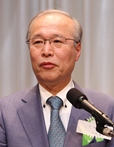Proper Diet for Healthy Longevity Society
November 28, 2012
Mr. Teiji Nakamura
Honorary President, The Japan Dietetic Association
President, Kanagawa University of Human Services
 I studied nutriology at my medical school nearly 40 years ago. As a young medical student, I got interested in preventive medicine and tried to formulate a system that prevents us from becoming ill. I conducted various tests with mice to identify factors that promote healthy long life. There are also negative factors, such as stress, insufficient exercise or smoking. Scientific evidences are being compiled today, thanks to research progress made in preventive medicine.
I studied nutriology at my medical school nearly 40 years ago. As a young medical student, I got interested in preventive medicine and tried to formulate a system that prevents us from becoming ill. I conducted various tests with mice to identify factors that promote healthy long life. There are also negative factors, such as stress, insufficient exercise or smoking. Scientific evidences are being compiled today, thanks to research progress made in preventive medicine.
Our food intake totals 2 kilograms a day. If we make it to 100, our food intake will exceed several dozen tons. I have long believed that food has a greater impact on our body than any other factors. As expected research studies have proved that dietary habits could trigger cancer, diabetes, cardiac illness or stroke. My speech today will be on proper dietary habits.
As one becomes more affluent, successful and powerful in society, he/she tends to seek food that brings perpetual youth and longevity. I must say, however, there is no such specific food that guarantees eternal life. Human life-span is said to be a maximum of about 120 years, so we are like travelers with a 120-year-long one-way ticket. You might be able to live longer, only if you happen to be a lucky mutation carrier.
I must also say that human beings are not as advanced as other animals in terms of nutrition. For example, human beings, monkeys and guinea-pigs are the only three animals that cannot synthesize Vitamin C in their own bodies. This is why dogs and cats can do without vegetables, or pandas can live solely on bamboos and koalas on eucalyptus. But human beings must intake a wide variety of food because we are yet to identify the complete nutritive food that guarantees our perfect health. Nutriology studies have identified essential nutrients for human-beings, which total 45-50 kinds including about 15 vitamins and 15 minerals in addition to essential amino acid, essential fatty acid and glucose.
Three astronauts travelled to the moon for 2 weeks by the Apollo Project. At that time, NASA tried to formulate a complete nutritive food and proudly announced that they had made a victorious achievement in nutriology by producing such space food. Research on this artificially-produced food was later suspended, however, as it was concluded that ingesting such toothpaste-like food in a tube could give negative effect and frustrate the astronauts. Meals are not all about nutrition but more about enjoying tasty food. Astronauts on space shuttle today are served ordinary in-flight meals.
Now let me give you the ��eight tips for a healthy lifestyle.
1) Stop smoking
2) Maintain standard body weight: Fatty liver has become a risk factor today.
3) Reduce intake of fatty meat, egg yolk and fish roe, while keeping moderate intake of seafood, soybean products and dairy products: The n-3 fatty acids from fish oils have potential health benefits. Isoflavones in soybean products are effective for female menopause disorder, cancer and arterial sclerosis. Humans are omnivorous animals because we must intake various kinds of food to absorb necessary nutritive substances. We are destined to make the right selection of food to keep a well-balanced diet.
4) Increase intake of vegetables, fruits, unrefined grains and seaweeds: Majority of academics agree that fiber-rich food is effective in preventing cancer. Quercetin in onions, isoflavone in soybeans and cryptoxanthin in mandarin oranges are also beneficial substances. Catechins in green tea are known to maintain our immunity function. We are also obtaining evidences that coffee beans possibly prevent diabetes.
5) Cut back on salt consumption: Physiological demand of salt is merely 1 gram a day for humans. If we try to make our daily salt intake less than 6 grams, we can prevent hypertension. If you suffer from overweight and high-blood pressure, however, you are advised to lose your weight first.
6) Cut back on excessive alcohol consumption and try to be a moderate drinker.
7) Keep regular eating habits and enjoy tasty meals: Our brain gives command to our digestive tract to prepare for digestion and absorption, when we sense the food to be ��tasty.�� This is why we have to spend much time over our meals and try to enjoy the tasty food. We feel happy when we enjoy tasty food together with a cheerful company. A recent study shows that the nerves that sense tastiness and happiness are closely located in our cerebrum.
8) Try to take moderate and sufficient exercise.
If you find any element among the aforementioned eight missing in your daily life, please try to reform your lifestyle. Let me close my speech by giving you an advice to weigh yourself every morning, right after you get up but before taking your breakfast. If you weigh less than the previous day, try to have a substantial meal. If you weigh more, try to eat sparingly. It is important to maintain this daily practice.